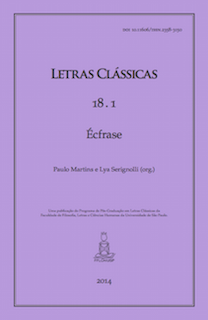Écfrase e o palco: teatralidade e recepção
DOI:
https://doi.org/10.11606/issn.2358-3150.v18i1p3-18Palavras-chave:
Écfrase, performance, tragédia grega, falas de mensageiro, enargeiaResumo
Para a teoria antiga, uma das características da écfrase – e do conceito afim da enargeia – é sua natureza teatral. A analogia com o palco está presente no objetivo expresso da écfrase (“transformar ouvintes em espectadores”), assim como seu uso é associado a contextos em que o emissor é concebido como participante de uma performance ao vivo diante de uma audiência. Este artigo trata das implicações da écfrase como performance para nossa leitura de uma série de textos, dando atenção especial para o uso de uma linguagem vívida na tragédia clássica, na qual as imagens evocadas pela fala do mensageiro existem em conformidade com a visão real do palco. Leitores de séculos posteriores parece que estavam conscientes desse efeito e de seus paradoxos, como sugere a presença, entre as Imagines de Filóstrato, de diversas cenas inspiradas em falas de mensageiros de tragédias, apresentadas como se fossem os motivos das pinturas. Portanto, duas formas de recepção devem ser consideradas: a recepção das peças pela audiência ateniense original; e a recepção dos textos dessas mesmas peças pelos leitores em períodos posteriores da Antiguidade.Downloads
Os dados de download ainda não estão disponíveis.
Downloads
Publicado
2014-08-02
Edição
Seção
Artigos
Licença
Autores que publicam nesta revista concordam com os seguintes termos:
- Autores mantém os direitos autorais e concedem à revista o direito de primeira publicação, com o trabalho licenciado simultaneamente sob uma Licença Creative Commons Attribution 2 anos após a publicação, permitindo o compartilhamento do trabalho com reconhecimento da autoria do trabalho e publicação inicial nesta revista.
- Autores têm autorização para assumir contratos adicionais separadamente, para distribuição não-exclusiva da versão do trabalho publicada nesta revista (ex.: publicar em repositório institucional ou como capítulo de livro), com reconhecimento de autoria e publicação inicial nesta revista.
- Autores têm permissão e são estimulados a publicar e distribuir seu trabalho online (ex.: em repositórios institucionais ou na sua página pessoal) a qualquer ponto antes ou durante o processo editorial, já que isso pode gerar alterações produtivas, bem como aumentar o impacto e a citação do trabalho publicado (Veja O Efeito do Acesso Livre).
Como Citar
Webb, R. (2014). Écfrase e o palco: teatralidade e recepção. Letras Clássicas, 18(1), 3-18. https://doi.org/10.11606/issn.2358-3150.v18i1p3-18


